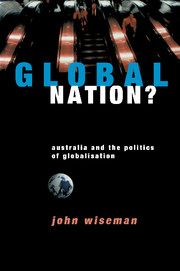Book contents
- Frontmatter
- Contents
- Abbreviations
- Acknowledgments
- 1 Introduction: Australia and the Politics of Globalisation
- 2 Breaking the Spell? Understanding Globalisation
- 3 Transforming the Global Economy? Trade, Capital and Power in the Late Twentieth Century
- 4 Onto the Global Racetrack? Globalising the Australian Economy
- 5 The Price of Competitiveness? The Social Impact of Globalisation on Australia
- 6 Wired to the World? Australia and the Globalisation of Media and Information Technologies
- 7 Nowhere to Hide? Australia in the Global Environment
- 8 Where in the World? Transforming Australian Political Relationships and National Identities
- 9 Alternative Strategies? Thinking and Acting Globally and Regionally
- 10 Alternative Directions? Thinking and Acting Locally and Nationally
- 11 Conclusion
- Notes
- Bibliography
- Index
5 - The Price of Competitiveness? The Social Impact of Globalisation on Australia
Published online by Cambridge University Press: 20 May 2010
- Frontmatter
- Contents
- Abbreviations
- Acknowledgments
- 1 Introduction: Australia and the Politics of Globalisation
- 2 Breaking the Spell? Understanding Globalisation
- 3 Transforming the Global Economy? Trade, Capital and Power in the Late Twentieth Century
- 4 Onto the Global Racetrack? Globalising the Australian Economy
- 5 The Price of Competitiveness? The Social Impact of Globalisation on Australia
- 6 Wired to the World? Australia and the Globalisation of Media and Information Technologies
- 7 Nowhere to Hide? Australia in the Global Environment
- 8 Where in the World? Transforming Australian Political Relationships and National Identities
- 9 Alternative Strategies? Thinking and Acting Globally and Regionally
- 10 Alternative Directions? Thinking and Acting Locally and Nationally
- 11 Conclusion
- Notes
- Bibliography
- Index
Summary
Whether in terms of the quiet immiseration of millions of people who have been pushed to the economic margins or of the shocking scenes of open warfare that are tearing whole countries apart, the world is now paying a heavy price for putting social issues in abeyance.
United Nations Research Institute on Social DevelopmentRatings agencies and fund managers attach much greater importance to goals such as low inflation, low taxation and small government than to low unemployment and social justice. This means governments are going to find it increasingly difficult to pay for welfare, health, education, labour market programs for disadvantaged workers and social and community infrastructure.
Former Labor Government economic adviser, Fred ArgyThe outcome of the 1996 Federal election highlighted two alarming and significant developments in Australian social and cultural relationships. The shift by working- and lower-middle-class voters away from the Labor Party appears to have been driven by an understandable sense that wages and security had both suffered as a result of the restructuring of the Australian economy over the previous thirteen years. At the same time there were the first signs of a resurgence of racially based prejudice and anger directed at migrants and Aborigines. Social polarisation and cultural fragmentation are both dangerous companions of competition in the global marketplace.
This chapter explores the impact of globalisation on Australian social and cultural relationships. The central argument is that the globalisation trends of the last twenty years have contributed to an increasing polarisation of power and resources along with the fragmentation of cultural relationships.
- Type
- Chapter
- Information
- Global Nation?Australia and the Politics of Globalisation, pp. 56 - 69Publisher: Cambridge University PressPrint publication year: 1998



